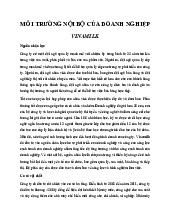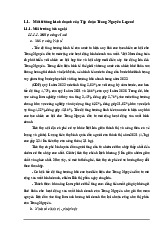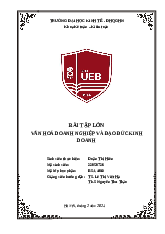



Preview text:
lOMoARcPSD|44744371 lOMoARcPSD|44744371 LÝ THUYẾT 1. Healthy Knowledge :
Health knowledge includes detailed and specific information about the causes,
incidence, risk factors, prevention, transmission, symptoms and treatment of diseases, as
well as about health services and patient rights.
Knowledge, motivation and capacity to access, understand, evaluate and apply
health information to make judgments and make decisions in everyday life related to
health care, disease prevention and health promotion to maintain or improve quality
of life throughout life (Sorensen et al., 2015, p. 1).
In addition, when it comes to health knowledge, people often associate it with specific
knowledge of the content and context of health care and healthcare” (Gellert et al, 2016, p 2034).
This is understandable because knowing the right knowledge and using it in the right
situation improves our health outcomes. At the same time, it is easy to see that
understanding health care also helps to improve knowledge and make optimal choices
for health care (Chin et al., 2011).
Today some consumers switch to research and choose to use because they believe:
Organic products are considered to support a healthy lifestyle - health and sustainability
can be explained by the way live (Kim & Chung, 2011). Health knowledge is important
when it comes to coping with and preventing chronic problems. Simply put, knowledge
about health is related to health behavior (Gellert et al., 2016). And Yin et al. (2010) found
that health benefits, such as health promotion and health protection, are the main drivers
for green consumption. Therefore, the team hypothesized that:
H1: Health knowledge has a positive effect on customer's attitude towards vegan cosmetics
2. Perceived authority support
The government is the highest authority in the Vietnamese state administrative system and
issues legal documents such as resolutions and decrees that can affect any business or
industry field. The government can allow and support legal activities, bring good benefits lOMoARcPSD|44744371
to society, or prevent actions that deviate from ethical standards and adversely affect
the community through regulations, policies and regulations. book. So perception of
government support (PAS) is the state that an individual is aware of the support,
permission and prohibition of any other individual or organization in performing the
behavior (Persada and Lin, 2016) that specifically in this article is the support of the government or the authorities.
For the issue of environmental protection and support for natural products, this is a
common trend of the whole world. Governments around the world have actively
responded and issued a series of large-scale regulations and policies aimed at protecting
the environment and nature. Under the support and promotion of the government,
propaganda on mass media channels, banners, regulations..., consumers' attitudes about
natural products in general and vegan cosmetics in particular gradually change and
increasing awareness of its benefits and importance. The number of consumers learning
and using vegan cosmetics is increasing day by day, they hunt and look for vegan
cosmetic suppliers and brands to replace the chemical cosmetic products they usually
use before. From this basis, the research team proposes the hypothesis that:
H2: Perceived government support has a positive effect on consumers' attitudes towards vegan cosmetics. 3. Value orientation
Through the process of socialization, people's personal values are formed and oriented as
different conceptions, characteristics of an individual or a group, which are the basis,
goal and motivation in all actions human(Kluckhohn, 1951). A person's core values can
influence his or her decisions, behavior, and attitudes. Based on this, companies,
businesses and sellers have conducted studies of the values that customers have to predict
some of their consumption behavior. According to Hui and Triandis (1986); McCarty and
Shrum (1994), collectivism and individualism are two frequently studied values in the
study of environmentally friendly products and ecological behavior. Individualists often
put their own interests and freedom first in everything, this value is close to . For
purchases too, they will buy products that are beneficial, better for them and can ignore lOMoARcPSD|44744371
the environmental benefits. The opposite of individualism are collectivists, who always
put group interests and goals ahead of their own interests, including political, economic,
environmental issues, etc. The conclusion is that collectivists tend to be more
environmentally friendly, while individualists tend to be more environmentally
unfriendly (McCarty and Shrum, 1994; Triandis, 1993). Similarly, public interest-
oriented consumers will have a more sympathetic attitude towards natural products than
individualistic consumers, so the research team proposes that:
H3: Value orientation is positively related to consumer attitudes towards vegan cosmetics.
4. Vegan cosmetic concept
Vegan cosmetics are entirely plant-based, excluding derivatives or animal ingredients
such as eggs, milk, snail extracts, bee extracts including honey, beeswax, or any other
animal products. In addition, vegan cosmetics are not tested on animals during testing or
production. Since 1990, cosmetics have been certified as vegan when eligible for approval
with the Vegan seal of certification organizations such as Vegan Action, The Vegan Society. 5. Attitude
Attitude theory is a broad concept in social psychology that helps researchers understand
how individuals form and maintain their attitudes toward different objects or problems.
Thurstone (1928) argued that an attitude is a set of feelings towards a certain object.
American psychologist Allport (1935) stated that “Attitude is the learned tendency
to react positively or negatively towards an object. Through attitudes, researchers
can predict action intentions.”
Fishben's (1975) view of attitude is more agreed upon by many researchers. Attitude
is the amount of affection a person has towards an object. Attitude will express one's
feelings of liking or disliking an object.
6. Perceived product necessity
Perceived product necessity describes the perceptions of consumers as regards whether or
not the product is necessary in their daily lives or to the domestic economy (Huddleston lOMoARcPSD|44744371
et al., 2001; Javalgi et al., 2005; Sharma et al., 1995). In the present-day life of the
consumer, perceived product necessity is becoming more important because lifestyles
change in tandem with what consumers perceive as essential in life (Javalgi et al.,
2005) H4: Perceived product necessity has a positive effect on attitude. 7. Purchase intention
Purchase intention is the anticipated or planned future behavior of individuals, and it is
the probability that beliefs and attitudes can be moved to act [51]. Planned behavior is the
main concern of marketing researchers because a lot of company decisions stem from the
prediction of consumer behavior. To predict behavior correctly, studies on the
relationship of attitudes and behaviors have been carried out, and in most of these studies,
attitude changes have been identified as a predisposing factor of behavioral changes. The
theory of reasoned action explains that there is a correlation between behavioral intention
and actual behavior [52]. The theory stipulates that when humans determine whether to
execute an action, they predict the rational outcomes that would result from carrying out
an action. The greater extent to which it is believed that positive consequences will result,
the more likely it is that the action will be carried out
H5. Product necessity has a positive impact on purchase




